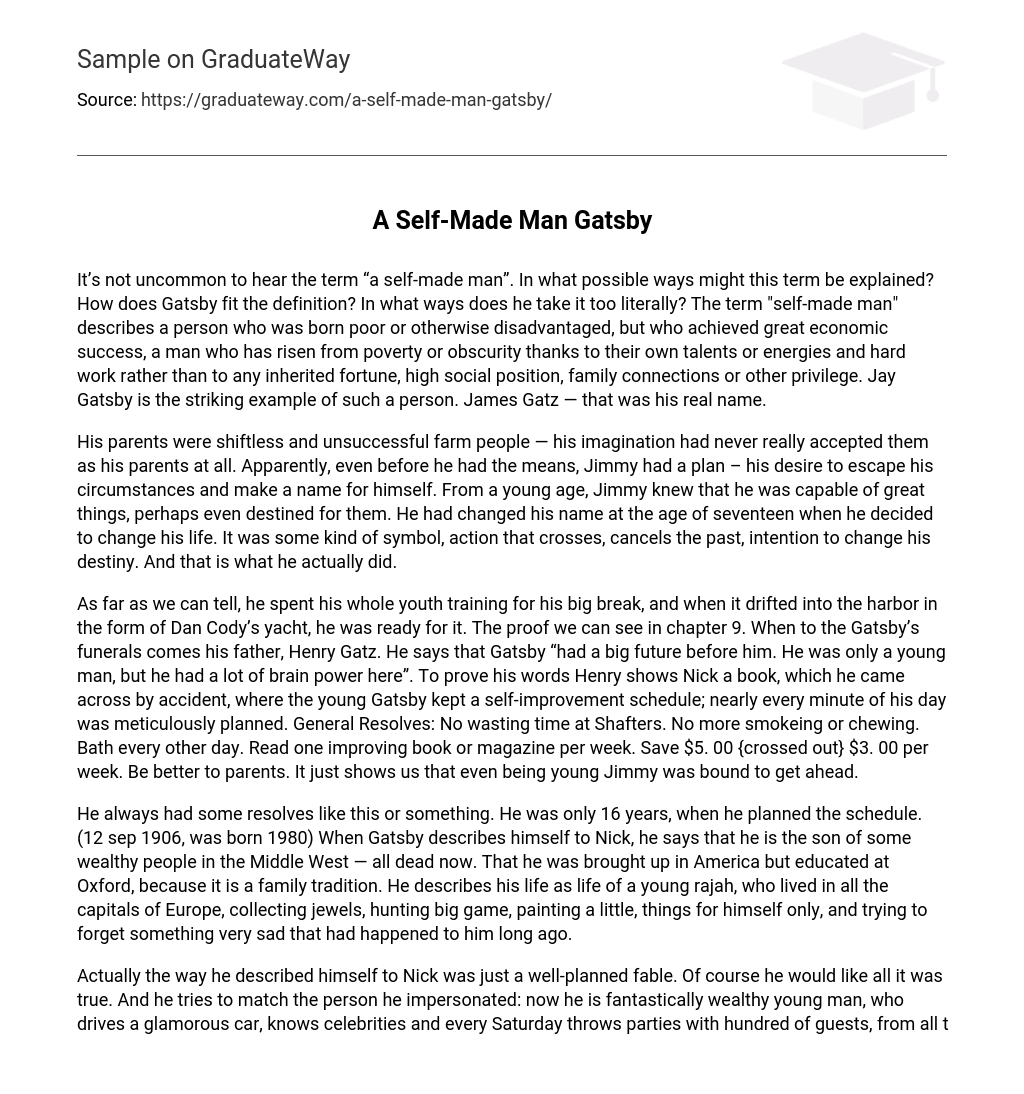The term “a self-made man” is frequently used to portray someone who was born in poverty or faced other disadvantages, yet achieved substantial economic success through their own talent, hard work, and determination. They did not rely on any inherited wealth, social status, family connections, or privileges. Jay Gatsby embodies this idea as he started off as James Gatz and came from humble origins.
Despite being born into a shiftless and unsuccessful farming family, Jimmy never truly viewed them as his parents in his imaginative mind. Despite facing limited resources, Jimmy always had a plan – a determination to break free from his circumstances and establish himself. From an early age, he firmly believed in his capacity to accomplish remarkable things, perhaps even being destined for it. At the age of seventeen, he made the decision to change his name as part of his mission to revolutionize his life. This action served as a symbolic gesture, representing the elimination and rejection of his past – an announcement to redefine his fate. And indeed, he achieved precisely that.
According to the text, it appears that the protagonist spent his entire youth preparing for an opportunity, which eventually arrived when Dan Cody’s yacht entered the harbor. This can be witnessed in chapter 9. During Gatsby’s funeral, his father, Henry Gatz, asserts that Gatsby had a promising future ahead of him despite his young age, emphasizing his intelligence. To substantiate this claim, Henry shows Nick a book he stumbled upon, containing a meticulously planned self-improvement schedule kept by a young Gatsby. The schedule included commitments to avoid wasting time at Shafters, quit smoking and chewing, take a bath every other day, read one educational publication per week, and save $3.00 per week. Additionally, one of the goals specified was to better treat his parents. Hence, it serves as evidence that even in his younger years, Gatsby was destined for success.
He always had certain resolutions or something similar. At the age of 16, he devised the schedule (born on 12 Sep 1906, died in 1980). When Gatsby explains himself to Nick, he mentions being the offspring of affluent individuals from the Midwest, who are now deceased. He was raised in America but received his education at Oxford due to a family tradition. He characterizes his existence as that of a youthful prince, residing in various European capitals, acquiring precious gems, engaging in big game hunting, dabbling in painting for personal satisfaction, and attempting to suppress the memory of a deeply sorrowful event from his distant past.
Actually the way he described himself to Nick was just a well-planned fable. Of course he would like all it was true. And he tries to match the person he impersonated: now he is fantastically wealthy young man, who drives a glamorous car, knows celebrities and every Saturday throws parties with hundred of guests, from all the area. So he invented just the sort of Jay Gatsby that a seventeen-year-old boy would be likely to invent, and to this conception he was faithful to the end. So, isn’t Jay Gatsby a vivid example of a self-made person?
From my perspective, I believe he is indeed Gatsby. He originated from a humble background, aspiring for a prosperous future. Presently, he has achieved immense wealth and has assimilated into high society, acquainted with its individuals and customs. Throughout his life, Gatsby had a yearning to amass wealth, yet the driving force behind this aspiration was his deep affection for Daisy Buchanan. Gatsby first encountered Daisy when he served as a young military officer in Louisville, prior to his deployment in World War I. Consequently, it is his love for Daisy that propels him towards self-reinvention, rather than baser desires or genuine ambition. Significantly, I feel that it is this very aspect that gives rise to Gatsby’s principal predicament and misfortune.
Despite the superficial values of wealth, social status, and petty concerns that consume others in his society, Gatsby’s true motivation lies in love. However, with the loss of his love for the second time, he also loses his sense of self. The question arises: is he still Jimmy Gatz or has he transformed into Jay Gatsby? In the cultural history of the United States, the concept of the self-made man holds great significance. It is seen as an iconic American figure and can be interpreted as an archetype, cultural ideal, myth, or cult.





